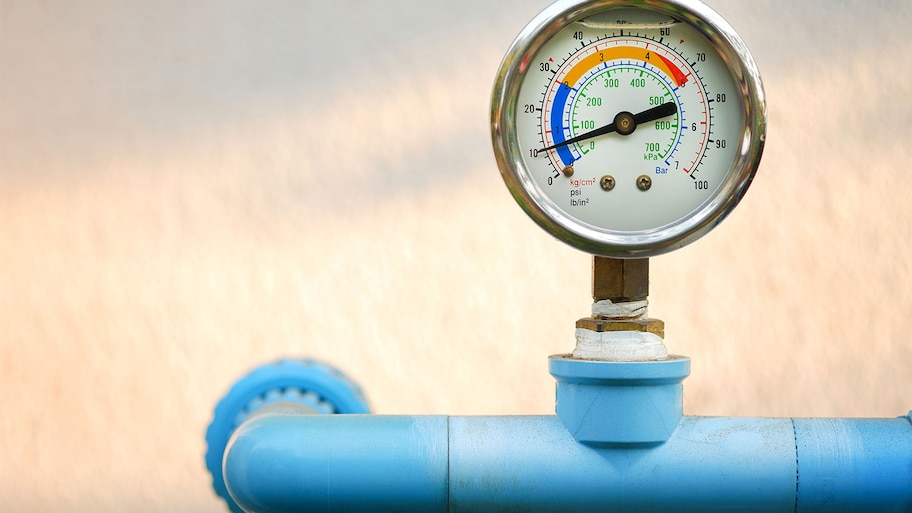How to Know if You Need a Water Pressure Regulator
A water pressure regulator can help preserve your appliances and make running water feel more comfortable


High water pressure may seem like a luxury in your shower, but the truth is that high water pressure is doing a number on your plumbing and appliances. A pressure-reducing valve may be the solution to keeping everything in working order.
If you think a water pressure regulator might be right for your home, read on to learn more.
What Is a Water Pressure Regulator?
A water pressure regulator is a valve that uses a diaphragm and spring to reduce pressure coming from the main water line. This plumbing device aims to get pressure to safe levels before the water comes into contact with your fixtures by making it harder for the water to pass through.
Water pressure regulators are usually placed right near your main water shutoff. If you’re not sure where your main water shutoff is located, talk to a local plumber.

How Do You Know if You Need a Water Pressure Regulator?
Testing your water pressure PSI (pounds per square inch) is the best way to determine if you need a water pressure regulator to avoid plumbing problems. A PSI between 50 and 70 is ideal. You're in the danger zone if you're hitting 80, and you may even be in code violation at that level.
Here are some signs your water pressure is too high:
Broken pipes
Running toilets
Dripping faucets
Damaged appliances
Banging sounds
Continual sound of running water
Unusually high water bills
It's also very common for homes attached to city water to have high PSI levels because city planners need to provide enough pressure for hydrants to access the top floors of commercial and residential buildings.
If you’re noticing any of these signs, you may want to look into adding a water pressure regulator.
Pros of Adding a Water Pressure Regulator
Water pressure regulators can have many benefits for homes with typically high water pressure.
Adding a Water Pressure Regulator Protects Your Appliances
High water pressure can prematurely wear out appliances like your dishwasher, washing machine, water softener, and water heater. Installing a water pressure regulator can be a much cheaper alternative to replacing some of the priciest appliances in your home.
It Preserves Your Plumbing Fixtures and Pipes
Reasonable water pressure levels can extend the life of a plumbing fixture by removing harmful pressure while also creating protection against pressure surges.
Regulating Your Water Pressure Can Lower Your Water Bill
Slowing down the pressure of the water coming through your pipes cuts down on water waste. In addition to being an eco-friendly perk, this reduces your monthly water bill. If you’re noticing a particularly high bill all of a sudden, this could be a solution.
Safe Water Pressure Improves Comfort
It may seem great to have high water pressure in your shower, but if you have particularly high pressure, you’ll know it can be anything but pleasant. High water pressure can even make doing the dishes or washing your hands irksome. If you have kids in the house, slowing down water pressure can help protect them against hot water that moves too quickly.
How Long Does a Water Pressure Regulator Last?
Most manufacturers recommend replacing your water pressure regulator every five years or so, though some, with regular maintenance, can last 10 years or more. You’ll likely notice signs that it’s time to replace your water heater, including: fluctuating water pressure, leaky pipes, or noisy pipes.
To extend the life of your water pressure regulator, have a local plumber perform regular maintenance on your regulator once every year. You’ll want to have it cleaned and inspected; make sure to replace any worn-down parts immediately.
Can I Install a Water Pressure Regulator Myself?
If you have some basic plumbing skills, you can install a water pressure regulator on your own. This DIY project will require cutting and soldering pipes, so you should be familiar with those processes. To ensure proper installation—and save yourself time—hire a plumber near you to install your water pressure regulator. Installation runs an average cost between $250 and $350.
Is Installing a Water Pressure Regulator Worth It?
A water pressure regulator is an upgrade that essentially pays for itself. Many homeowners see water usage decline by 30% after getting PSI down in the range of 50 to 60. In addition to lowering monthly water bills, you're potentially saving thousands by boosting longevity for pipes, fixtures, and appliances.
When you consider that the average cost of installing a water pressure regulator is between $250 and $350, the investment is worth it.
Plumbers can usually install new water pressure regulators in just a few hours. Find a plumbing repair service near you to get a quote and get the process started.
